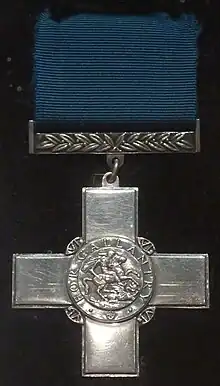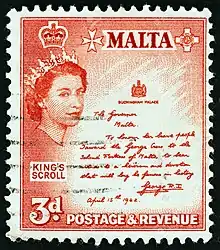
The George Cross was awarded to the island of Malta by King George VI during the Siege of Malta undertaken by Italy and Germany in the early part of World War II. In a letter to the island's Governor, Lieutenant-General Sir William Dobbie, King George wrote, "so as to bear witness to the heroism and devotion of its people". The island was a British colony from 1813 to 1964. The George Cross was incorporated into the flag of Malta beginning in 1943 and remains on the current design of the flag.
Historical background

Italian and German bombers attacked the Maltese islands and there was a lack of supplies. An invasion threat in July 1941 failed when coast defenders spotted torpedo boats of the Italian Decima MAS special forces. Whilst people suffered hunger, a final assault to neutralise the island was ordered by the German Field Marshal Albert Kesselring. However, the assault failed. On 15 April 1942, King George VI awarded the George Cross to the people of Malta in appreciation of their heroism.[1]
The George Cross was awarded during the worst period for the Allies during the Second World War, as the Axis-forces had the upper hand. German planes struck the island round the clock, in an attempt to neutralise British bases, which interfered with naval attempts to supply Rommel's North African campaign. Malta's geographic position, between Italy and North Africa, dividing the Mediterranean basin into east and west put the islands in danger. Malta-based British aircraft could reach a range as far as Tripoli in Libya to the south, Tunisia to the west and German bases in Italy to the north; on Pantelleria, Sicily, and as far as the port of Naples farther to the north.[2]
At the time of the George Cross award, military resources and food rations in Malta were practically depleted. Fuel was restricted to military action and heavily rationed, the population was on the brink of starvation, and even ammunition was running out, such that Anti-Aircraft (AA) guns could only fire a few rounds per day.[3]
Italian battleships of the Regia Marina out-gunned the British, yet the Royal Navy was not out-classed.[4] The German airforce had superior aircraft until Spitfires were sent to Malta in 1942. Also at this time, German and Italian plans for Operation Herkules, a sea and air invasion of the Maltese Islands, had to be repeatedly postponed – until it was too late because the Maltese Islands finally received a vital supply of fuel, food, and munitions.
On 15 August 1942 (the feast day of Santa Marija also known as Assumption of Mary Day) a convoy of Royal and Merchant Navy ships finally made port in Convoy of Santa Maria[5] at Valletta's Grand Harbour, after completing what has been considered one of the most heroic maritime episodes in recent history.
The George Cross Award
The George Cross was instituted by King George VI, on 24 September 1940, replacing the Empire Gallantry Medal. It is the civilian equivalent to the Victoria Cross. While intended mainly for civilians, it is awarded also to certain fighting services, confined however to actions for which purely military honours are not normally given.[6] This medal is awarded only for acts of the greatest heroism or the most conspicuous courage in circumstances of extreme danger.[7]
Awarded to Malta


One of only three collective awards of the George Cross was the award to Malta.[8] This award was made by King George VI in a handwritten letter:
"The Governor
Malta
To honour her brave people I award the George Cross to the Island Fortress of Malta to bear witness to a heroism and devotion that will long be famous in history.
George R.I.
Lieutenant-General Sir William Dobbie answered:
"By God's help, Malta will not weaken but will endure until victory is won.[10]"
A public award ceremony in Valletta was held on 13 September 1942, after the arrival of the Santa Maria Convoy.[11]
Today

The Cross and the King's message are today found in the National War Museum in Fort Saint Elmo, Valletta.
Harrods department store[12] flew the Maltese flag to mark Malta's 70th anniversary as a George Cross Island[13] from the 1 to 28 March 2012.[14]
References
- ↑ "The GC Collective Awards". Archived from the original on 28 April 2007. Retrieved 22 May 2007.
- ↑ "ITALIAN CAMPAIGN 1943–1945". Archived from the original on 30 April 2007. Retrieved 22 May 2007.
- 1 2 "The George Cross Award". Archived from the original on 8 August 2009. Retrieved 22 May 2007.
- ↑ "Royal Naval Reservists commemorate Malta's George Cross". Archived from the original on 8 May 2007. Retrieved 22 May 2007.
- ↑ "Photos of Operation Pedestal". Archived from the original on 11 March 2007. Retrieved 22 May 2007.
- ↑ Which could not therefore be recognised by a military decoration, given that they typically require gallantry in the face of the enemy.
- ↑ "No. 35060". The London Gazette. 31 January 1941. pp. 622–623.
- ↑ The others being those to the Royal Ulster Constabulary and National Health Service.
- ↑ Image of handwritten letter Archived 21 January 2015 at the Wayback Machine World War II today
- ↑ "Presentation of the George Cross". Archived from the original on 20 April 2008.
- ↑ "George Cross awarded to Malta 70 years ago today". 15 April 2012. Archived from the original on 2 March 2014. Retrieved 27 February 2014.
- ↑ Visit, Malta. "Harrods Malta". Malta Tourism Authority. Archived from the original on 12 March 2012.
- ↑ Malta, Independent. "Malta's hidden gems". Malta Independent. Archived from the original on 18 January 2012.
- ↑ Times of, Malta (13 March 2012). "Malta all over Harrods". The times of malta. Archived from the original on 15 March 2012. Retrieved 13 March 2012.
